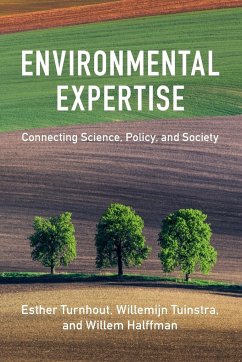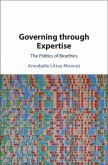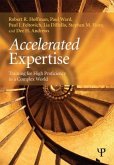Esther Turnhout (The Netherlands Wageningen Universiteit), Willemijn Tuinstra (Open Universiteit), Willem Halffman (Radboud Universiteit Nijmegen)
Environmental Expertise
Esther Turnhout (The Netherlands Wageningen Universiteit), Willemijn Tuinstra (Open Universiteit), Willem Halffman (Radboud Universiteit Nijmegen)
Environmental Expertise
- Broschiertes Buch
- Merkliste
- Auf die Merkliste
- Bewerten Bewerten
- Teilen
- Produkt teilen
- Produkterinnerung
- Produkterinnerung
An overview of the connection between science and society, discussing the challenges faced by environmental experts, including how to communicate effectively, identify sources of disagreement and tackle controversial topics. With numerous case studies and practical solutions, this is an essential resource for scientists and professionals.
Andere Kunden interessierten sich auch für
![Governing through Expertise Governing through Expertise]() Annabelle Littoz-Monnet (Graduate Institute of International and DeGoverning through Expertise113,99 €
Annabelle Littoz-Monnet (Graduate Institute of International and DeGoverning through Expertise113,99 €![Expertise in Transition Expertise in Transition]() Yrjo Engestrom (University of Helsinki)Expertise in Transition39,99 €
Yrjo Engestrom (University of Helsinki)Expertise in Transition39,99 €![The Expertise of Perception The Expertise of Perception]() James W. Tanaka (British Columbia University of Victoria)The Expertise of Perception30,99 €
James W. Tanaka (British Columbia University of Victoria)The Expertise of Perception30,99 €![Law, Legal Expertise and EU Policy-Making Law, Legal Expertise and EU Policy-Making]() Law, Legal Expertise and EU Policy-Making137,99 €
Law, Legal Expertise and EU Policy-Making137,99 €![Constructing Political Expertise in the News Constructing Political Expertise in the News]() Kathleen Searles (Louisiana State University)Constructing Political Expertise in the News25,99 €
Kathleen Searles (Louisiana State University)Constructing Political Expertise in the News25,99 €![Rethinking Expertise Rethinking Expertise]() Harry Collins (Cardiff University)Rethinking Expertise38,99 €
Harry Collins (Cardiff University)Rethinking Expertise38,99 €![Accelerated Expertise Accelerated Expertise]() Robert R. HoffmanAccelerated Expertise90,99 €
Robert R. HoffmanAccelerated Expertise90,99 €-
-
-
An overview of the connection between science and society, discussing the challenges faced by environmental experts, including how to communicate effectively, identify sources of disagreement and tackle controversial topics. With numerous case studies and practical solutions, this is an essential resource for scientists and professionals.
Hinweis: Dieser Artikel kann nur an eine deutsche Lieferadresse ausgeliefert werden.
Hinweis: Dieser Artikel kann nur an eine deutsche Lieferadresse ausgeliefert werden.
Produktdetails
- Produktdetails
- Verlag: Cambridge University Press
- Seitenzahl: 290
- Erscheinungstermin: 28. Februar 2019
- Englisch
- Abmessung: 229mm x 152mm x 16mm
- Gewicht: 434g
- ISBN-13: 9781107491670
- ISBN-10: 1107491673
- Artikelnr.: 53486846
- Herstellerkennzeichnung
- Libri GmbH
- Europaallee 1
- 36244 Bad Hersfeld
- gpsr@libri.de
- Verlag: Cambridge University Press
- Seitenzahl: 290
- Erscheinungstermin: 28. Februar 2019
- Englisch
- Abmessung: 229mm x 152mm x 16mm
- Gewicht: 434g
- ISBN-13: 9781107491670
- ISBN-10: 1107491673
- Artikelnr.: 53486846
- Herstellerkennzeichnung
- Libri GmbH
- Europaallee 1
- 36244 Bad Hersfeld
- gpsr@libri.de
Esther Turnhout is a Professor at the Forest and Nature Conservation Policy Group of Wageningen Universiteit, The Netherlands. Her research program, 'The Politics of Environmental Knowledge', includes research into the different roles experts play at the science-policy interface, the political implications of policy-relevant environmental knowledge and the interaction between science, society and citizens.
List of contributors
Preface
List of abbreviations
1. Introduction: the plight of the environmental scientist Willem Halffman, Esther Turnhout and Willemijn Tuinstra
2. What is science? (And why does this matter?) Willem Halffman
3. Frames: beyond facts versus values Willem Halffman
Case A. Framing climate change Mike Hulme
4. Science, politics and the public in knowledge controversies Esther Turnhout and Thomas Gieryn
Case B. What does 'climategate' tell us about public knowledge controversies? Silke Beck
Case C. Whose deficit anyway? Institutional misunderstanding of fracking sceptical publics Laurence Williams and Phil Macnaghten
5. The limits to knowledge Willemijn Tuinstra, Ad Ragas and Willem Halffman
Case D. Angry bulbs Ad Ragas and Marga Jacobs
6. Usable knowledge: science, policy and society Willemijn Tuinstra, Willem Halffman and Esther Turnhout
Case E. Expertise for European fisheries policy Willem Halffman and Martin Pastoors
7. Interdisciplinarity and the challenge of knowledge integration Esther Turnhout
Case F. Knowledge integration in the Millennium Ecosystem Assessment Clark Miller
Case G. Integrated assessment for long-range transboundary air pollution Willemijn Tuinstra
8. Lay expertise Esther Turnhout and Katja Neves
Case H. Lay expertise and botanical science: a case of dynamic interdependencies in biodiversity conservation Katja Neves
Case I. The Loweswater Care Project Claire Waterton
9. Environmental Experts at the science-policy-society interface Esther Turnhout
Case J. Group Think and whistle blowers in CO2 capture and storage Heleen de Coninck
10. Environmental knowledge in democracy Esther Turnhout, Willem Halffman and Willemijn Tuinstra
11. Conclusion: science, reason and the environment Willem Halffman, Willemijn Tuinstra and Esther Turnhout
Inde
Preface
List of abbreviations
1. Introduction: the plight of the environmental scientist Willem Halffman, Esther Turnhout and Willemijn Tuinstra
2. What is science? (And why does this matter?) Willem Halffman
3. Frames: beyond facts versus values Willem Halffman
Case A. Framing climate change Mike Hulme
4. Science, politics and the public in knowledge controversies Esther Turnhout and Thomas Gieryn
Case B. What does 'climategate' tell us about public knowledge controversies? Silke Beck
Case C. Whose deficit anyway? Institutional misunderstanding of fracking sceptical publics Laurence Williams and Phil Macnaghten
5. The limits to knowledge Willemijn Tuinstra, Ad Ragas and Willem Halffman
Case D. Angry bulbs Ad Ragas and Marga Jacobs
6. Usable knowledge: science, policy and society Willemijn Tuinstra, Willem Halffman and Esther Turnhout
Case E. Expertise for European fisheries policy Willem Halffman and Martin Pastoors
7. Interdisciplinarity and the challenge of knowledge integration Esther Turnhout
Case F. Knowledge integration in the Millennium Ecosystem Assessment Clark Miller
Case G. Integrated assessment for long-range transboundary air pollution Willemijn Tuinstra
8. Lay expertise Esther Turnhout and Katja Neves
Case H. Lay expertise and botanical science: a case of dynamic interdependencies in biodiversity conservation Katja Neves
Case I. The Loweswater Care Project Claire Waterton
9. Environmental Experts at the science-policy-society interface Esther Turnhout
Case J. Group Think and whistle blowers in CO2 capture and storage Heleen de Coninck
10. Environmental knowledge in democracy Esther Turnhout, Willem Halffman and Willemijn Tuinstra
11. Conclusion: science, reason and the environment Willem Halffman, Willemijn Tuinstra and Esther Turnhout
Inde
List of contributors
Preface
List of abbreviations
1. Introduction: the plight of the environmental scientist Willem Halffman, Esther Turnhout and Willemijn Tuinstra
2. What is science? (And why does this matter?) Willem Halffman
3. Frames: beyond facts versus values Willem Halffman
Case A. Framing climate change Mike Hulme
4. Science, politics and the public in knowledge controversies Esther Turnhout and Thomas Gieryn
Case B. What does 'climategate' tell us about public knowledge controversies? Silke Beck
Case C. Whose deficit anyway? Institutional misunderstanding of fracking sceptical publics Laurence Williams and Phil Macnaghten
5. The limits to knowledge Willemijn Tuinstra, Ad Ragas and Willem Halffman
Case D. Angry bulbs Ad Ragas and Marga Jacobs
6. Usable knowledge: science, policy and society Willemijn Tuinstra, Willem Halffman and Esther Turnhout
Case E. Expertise for European fisheries policy Willem Halffman and Martin Pastoors
7. Interdisciplinarity and the challenge of knowledge integration Esther Turnhout
Case F. Knowledge integration in the Millennium Ecosystem Assessment Clark Miller
Case G. Integrated assessment for long-range transboundary air pollution Willemijn Tuinstra
8. Lay expertise Esther Turnhout and Katja Neves
Case H. Lay expertise and botanical science: a case of dynamic interdependencies in biodiversity conservation Katja Neves
Case I. The Loweswater Care Project Claire Waterton
9. Environmental Experts at the science-policy-society interface Esther Turnhout
Case J. Group Think and whistle blowers in CO2 capture and storage Heleen de Coninck
10. Environmental knowledge in democracy Esther Turnhout, Willem Halffman and Willemijn Tuinstra
11. Conclusion: science, reason and the environment Willem Halffman, Willemijn Tuinstra and Esther Turnhout
Inde
Preface
List of abbreviations
1. Introduction: the plight of the environmental scientist Willem Halffman, Esther Turnhout and Willemijn Tuinstra
2. What is science? (And why does this matter?) Willem Halffman
3. Frames: beyond facts versus values Willem Halffman
Case A. Framing climate change Mike Hulme
4. Science, politics and the public in knowledge controversies Esther Turnhout and Thomas Gieryn
Case B. What does 'climategate' tell us about public knowledge controversies? Silke Beck
Case C. Whose deficit anyway? Institutional misunderstanding of fracking sceptical publics Laurence Williams and Phil Macnaghten
5. The limits to knowledge Willemijn Tuinstra, Ad Ragas and Willem Halffman
Case D. Angry bulbs Ad Ragas and Marga Jacobs
6. Usable knowledge: science, policy and society Willemijn Tuinstra, Willem Halffman and Esther Turnhout
Case E. Expertise for European fisheries policy Willem Halffman and Martin Pastoors
7. Interdisciplinarity and the challenge of knowledge integration Esther Turnhout
Case F. Knowledge integration in the Millennium Ecosystem Assessment Clark Miller
Case G. Integrated assessment for long-range transboundary air pollution Willemijn Tuinstra
8. Lay expertise Esther Turnhout and Katja Neves
Case H. Lay expertise and botanical science: a case of dynamic interdependencies in biodiversity conservation Katja Neves
Case I. The Loweswater Care Project Claire Waterton
9. Environmental Experts at the science-policy-society interface Esther Turnhout
Case J. Group Think and whistle blowers in CO2 capture and storage Heleen de Coninck
10. Environmental knowledge in democracy Esther Turnhout, Willem Halffman and Willemijn Tuinstra
11. Conclusion: science, reason and the environment Willem Halffman, Willemijn Tuinstra and Esther Turnhout
Inde








